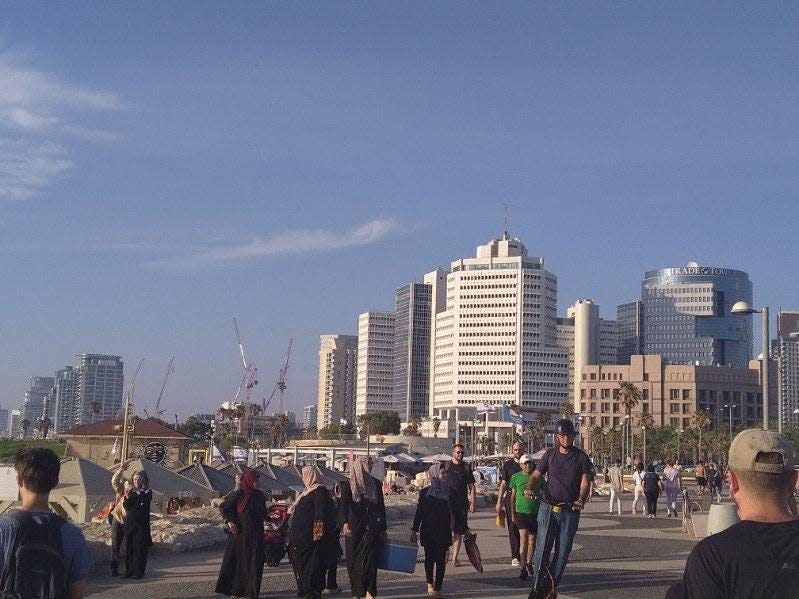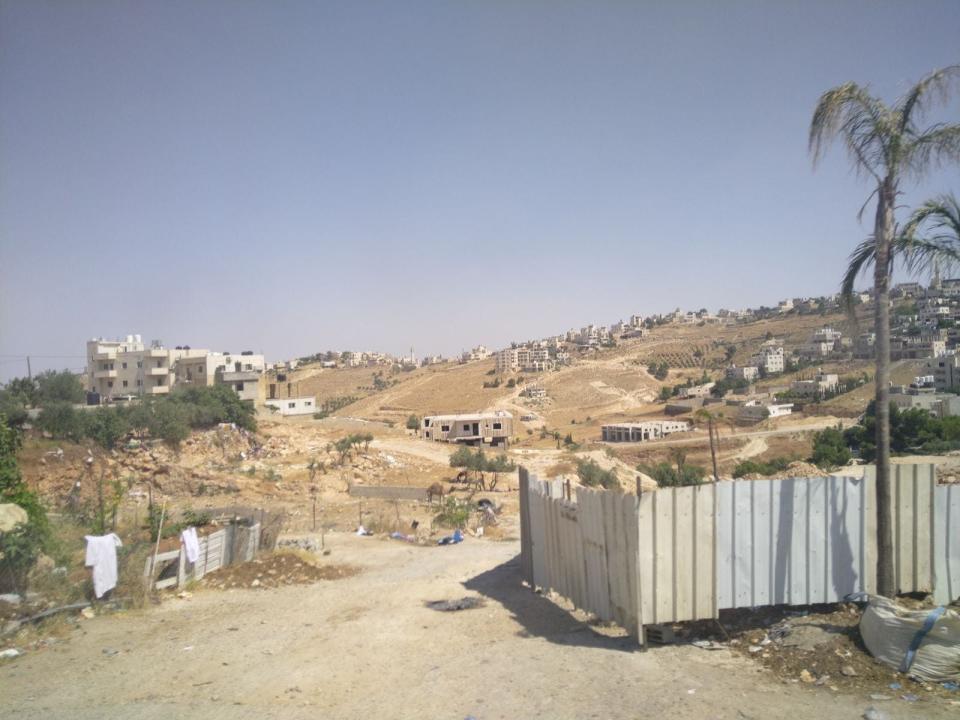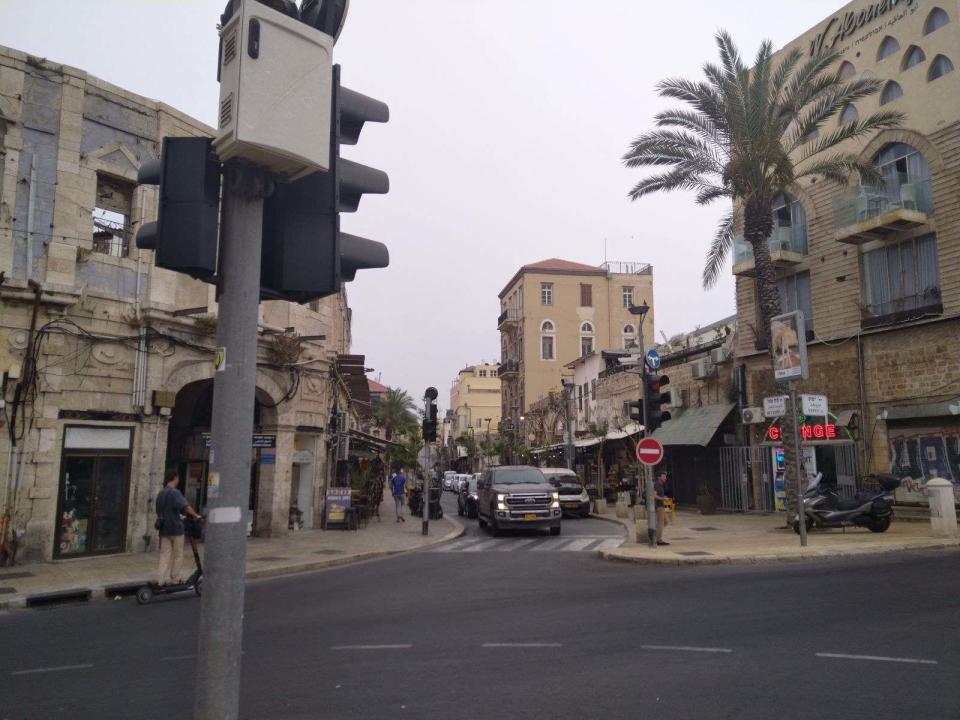As war breaks out, former Bloomington resident stays committed to life in Israel
Editor's note: This story has been updated to correct which government arranged the charter flights out of Israel.
Bloomington native and Indiana University alum Julie Steigerwald sheltered with her family in her home in Tel Aviv, Israel, when Hamas attacked on the morning of Oct. 7.
Rockets were launched during the Jewish holiday of Simchat Torah, a joyful time celebrating the conclusion of the annual cycle of Torah readings and the beginning of a new cycle.
"It was certainly no accident that it happened then," Julie's mother, Anne Steigerwald, said about the attacks.
Julie Steigerwald was born in Bloomington and studied international communications at IU. Born into the small but vibrant Jewish community of Bloomington, she lived here for the first 23 years of her life before moving to Israel. She spent a semester studying in Israel and decided she would return after graduation.
"I never really intended to move here permanently," she said, "but I fell in love with those first few times that I came … I stayed for work, I was a former journalist for The Jerusalem Post, and then I met my now-husband, and we have an almost 1-year-old son together."
Julie currently works as a public relations specialist for Israeli tech companies. She had been working from home when the country was attacked.
Waking to the sounds of sirens
The Steigerwalds were in bed when they first heard the sirens early in the morning on Oct. 7.
"We woke up at 6:30 in the morning to rocket sirens going off in the Tel Aviv area," Julie described. "It happens, but it's pretty unusual. There was another one at 7:30 … We turned on the TV and one unbelievable thing after another kept unfolding, and we were glued to the TV between several rocket sirens going off, I believe several times that day. Since then, myself and my family, and the whole country has been in a collective state of shock, and trauma, and anger, and sadness about what's happened."

Israel is a small country on the eastern shores of the Mediterranean Sea at the historic crossroads of Asia, Africa and Europe. It has a population of 9.1 million people and occupies approximately 8,600 square miles, or a quarter of the total area of Indiana. The Gaza Strip is an even smaller territory at a mere 141 square miles.
"Israel is a small country," Julie explained. "On this scale, it feels personal to all of us. Everyone is two degrees of separation here. I think most families in this country know someone who either was in one of the communities that was attacked, or was missing, or was killed, or now has been called up to the front lines.
"You feel that there's this cloud hanging over everyone. Everyone's on edge. Just in our daily routine, my son hasn't been in daycare for the past two weeks. I know a lot of the schools from Tel Aviv south haven't been in session for the past two weeks. I think some a little north have started going back (to school) … Ever since then, there has still been rocket fire even on the Tel Aviv area. I guess most of it's in the southern part of the country, but every now and then the sirens go off and we have to go to the saferoom or the stairwell. Here it usually happens in the evening."
Mourning with community, living under threat
Julie described how Israel's anti-missile defense system protects the country from rocket attacks.
Conceived in the early 2000s and put into operation in 2011, the Iron Dome intercepts enemy rockets with rockets of its own when its system of radars detects an enemy projectile. The Iron Dome was put to the test in the recent attacks as it fought off one of the heaviest bombardments of Palestinian missiles since its deployment.
No one in her immediate family perished in the bombings, but Julie has felt the losses of those in her community. She has attended two shiva services commemorating those who have lost their lives since the attacks began. A shiva is a Jewish funeral ceremony where family members of the deceased mourn for seven days. The country is abundant with such services.

Hamas has launched several attacks upon Israel over decades and continued to do so during the 13 years Julie has lived there. She recalled two major military advances while living in Israel — the 2014 Gaza War and the 2021 Israel-Palestinian Conflict, the latter of which broke out during the week of her wedding. She also was visiting Israel with her family in 2006 when Hezbollah attacked Israeli forces during the 2006 Lebanon War.
When she first moved to Israel, she first lived in a kibbutz, or a communal farm, approximately 4 kilometers from Gaza. "There were rockets all the time, but I never saw it reported on the news. There, you only have 10 seconds to run, whereas in Tel Aviv you have a minute and a half after the sirens are activated to find shelter."
Now living farther north, she describes Tel Aviv as the safest place one can be in Israel, relatively speaking. The farthest she has traveled since Oct. 7 was 12 kilometers north to Ramat HaSharon, where she attended the shiva of a friend whose cousin had been killed.
The atmosphere of shock and confusion was punctuated by a nationwide spirit of mutual cooperation. "It's really amazing (to see) the civilian and volunteer initiatives that have popped up. … We don't know what else to do, because you still have to go on, and everyone wants to contribute in some way and keep busy and do something productive to help others. That's one little ray of light in all of this darkness.
"The Israeli sentiment is very fraternal. In routine times, people argue with each other, that kind of thing, but in times of need, I think it's really astonishing how the Israeli society is the first to come to each other's side. When someone's in trouble, they will immediately jump into action and do what they can to help."
Julie has been active as a volunteer in several relief efforts. One of her friends is a cooking teacher who used her studio to cook hot meals for families in need. "There are thousands of families who have been displaced from combat zones and they've been placed in hotels, rental condos … and also for soldiers who were called up without much warning. It's one of the only points of relief to see people rising to the occasion and helping each other."
From Bloomington to Tel Aviv and back
Julie's parents, Gary and Anne, are current residents of Bloomington who traveled to Tel Aviv on the eve of their grandson's first birthday. Aware of Israel's volatile state well before Oct. 7, the two-week journey they planned for was elongated by only one day. "It was one week of peace and one week of war," Anne commented.
Gary and Anne booked a hotel for most of their trip. However, they were at Julie's home during the initial bombardment and sheltered there for another day. Their hotel was only an 11-minute walk away, but there was nowhere for Anne and Gary to take shelter as the sky teemed with missiles.
"(The rockets) serve no military purpose," Anne stated. "They’re not very accurate. They’re just there to terrorize and harass civilians … they’re not aimed at any military installations or military bases."

To make matters worse, their passage back to the United States was anything but simple. All American flights were canceled and it was impossible to book any other commercial flight out of Israel.
Commercial airline websites were unreliable as vacant seats were claimed moments before Anne clicked the button to confirm her reservation.
Gary and Anne's hotel was another hub of volunteering. The hotel gave shelter to approximately 700 people who fled from southern Israel, where the majority of the combat is taking place. They were treated to catered meals and games were provided for the children. Anne spent the remainder of her trip in the hotel volunteering with her daughter.
Julie found a silver lining to her family's confinement together.
"I can say for me personally, it was comforting to have my parents here, just to have that emotional support and help with my son. It definitely helped me to keep my head on to have them here, and it gave me a bit more space to volunteer and do a little bit of work."
Anne echoed the same sentiment. "When I was there I didn't worry about her so much because she was right nearby. But now that I'm back in the United States, I wake up every morning worrying about her and what happened overnight."
After days of searching for an outbound flight, the U.S. state department announced charter flights for U.S. citizens. The Steigerwalds signed up for a charter flight and headed to the airport without knowingwhere they would be taken to next. They were flown to Athens and a few days later they boarded a flight to New York City. They have safely returned to Bloomington.
"When they left, it was bittersweet for me," Julie said. "There was relief on one hand, that they were able to make a safe departure, but on the other hand, being with families and loved ones is one of the only sources of relief apart from being able to volunteer and stay busy."
Julie is committed to living in Tel Aviv despite the danger of war.
"It's a question I always ask myself," she said. "What keeps me going. It's an ebb and a flow. I have my times when I want to go back and be closer to my own nuclear family, and there are times when I feel this is my home, or at least one of my homes, and it's important that we stay and help the country prosper during its time of need, for better or worse."
This article originally appeared on The Herald-Times: IU grad talks about living in Israel in a time of war

